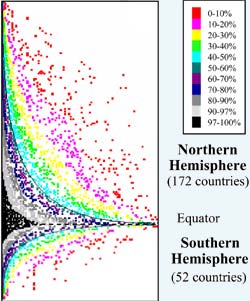Ecology drives the worldwide distribution of human diseases

Mounting evidence suggests that ecological and climatic conditions influence the emergence, spread, and recurrence of infectious diseases. Global climate change is likely to aggravate climate-sensitive diseases in unpredictable ways.
Increasingly, public health programs aimed at preventing and controlling disease outbreaks are considering aspects of the ecology of infectious diseases–how hosts, vectors, and parasites interact with each other and their environment. The hope is that by understanding how ecological factors impact the global distribution of parasitic and infectious diseases, public health officials can predict and contain future outbreaks.
Even though parasitic and infectious organisms account for a major fraction of the biological diversity on the planet, few studies have analyzed the factors affecting the spatial distribution of these organisms or attempted to quantify their contribution to biodiversity. In this issue, Vanina Guernier, Michael Hochberg, and Jean-Francois Guegan address the influence of ecological factors on the biological diversity and distribution of parasitic and infectious diseases. After compiling epidemiological data on 332 different human pathogens across 224 countries, Guernier et al. used sophisticated statistical modeling methods to identify and characterize the influence of a number of potential contributing factors on species richness. They found that climatic factors are the most important determinant of the global distribution of human pathogens.
The finding has important implications for predicting and managing future infectious disease outbreaks. These results counter the conventional assumption that socioeconomic conditions are the most important factor in controlling disease, indicating that global climate change could have far more significant effects on global patterns of disease, with diseases once relegated to the tropics migrating to temperate zones, for example. Identifying the links between ecology and disease, however, could lay the foundation for effective preventive strategies.
Citation: Guernier V, Hochberg ME, Guegan J-F (2004) Ecology drives the worldwide distribution of human diseases. PLoS Biol 2(6):e141. DOI: 10.1371/journal.pbio.0020141.
CONTACT:
Vanina Guernier
IRD
Unite de Genetique des Maladies Infectieuses
Montpellier, France
33-0-4-6741-6205
guernier@mpl.ird.fr
Media Contact
All latest news from the category: Health and Medicine
This subject area encompasses research and studies in the field of human medicine.
Among the wide-ranging list of topics covered here are anesthesiology, anatomy, surgery, human genetics, hygiene and environmental medicine, internal medicine, neurology, pharmacology, physiology, urology and dental medicine.
Newest articles

A universal framework for spatial biology
SpatialData is a freely accessible tool to unify and integrate data from different omics technologies accounting for spatial information, which can provide holistic insights into health and disease. Biological processes…

How complex biological processes arise
A $20 million grant from the U.S. National Science Foundation (NSF) will support the establishment and operation of the National Synthesis Center for Emergence in the Molecular and Cellular Sciences (NCEMS) at…

Airborne single-photon lidar system achieves high-resolution 3D imaging
Compact, low-power system opens doors for photon-efficient drone and satellite-based environmental monitoring and mapping. Researchers have developed a compact and lightweight single-photon airborne lidar system that can acquire high-resolution 3D…





















